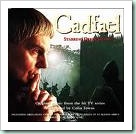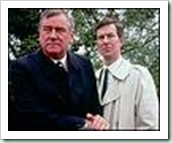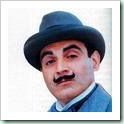Whilst busy sewing last night and this morning, I listened to two BBC7 'Paulo Baldi' detective stories. Which has left me thinking about detectives in books/TV/Radio. My friend Nick has rightly commented that there is a preponderance of dysfunctional characters with monosyllabic names on the box [Morse, House, Shark, Monk, Hack ...] but I realised last night that there is also a plethora of religious sleuths.
 Baldi is a Franciscan priest, as is Father William Baskerville [Name of the Rose, Eco] Cadfael is a Benedictine Monk, Father Brown is a Catholic Priest, and I was beginning to think they were all Catholics till I came across this list. Most of these seem to be from the US though. The 'Rabbi' series by Harry Kemelmann is great, and I have read most of them - they give a good insight into the life of modern day practising Jews in the States. I am intrigued by the idea of Lady Lupin Hastings, the Vicar's Wife! I shall have to try and get that from the library.
Baldi is a Franciscan priest, as is Father William Baskerville [Name of the Rose, Eco] Cadfael is a Benedictine Monk, Father Brown is a Catholic Priest, and I was beginning to think they were all Catholics till I came across this list. Most of these seem to be from the US though. The 'Rabbi' series by Harry Kemelmann is great, and I have read most of them - they give a good insight into the life of modern day practising Jews in the States. I am intrigued by the idea of Lady Lupin Hastings, the Vicar's Wife! I shall have to try and get that from the library.
Why the connection between the priesthood and detection? Is it that priests are supposed to have a better understanding of sin than other mortals, so can spot the murderer? Or is the discipline of study,contemplation and sermon preparation some sort of suitable brain-training for developing powers of logic and deduction necessary for sleuthing? Or does their pastoral manner mean that people open up to them, and say more in conversation than they might otherwise, thus revealing clues?
I guess that for the authors, the celibate priesthood is useful - you don't have to work out the details of the spouse! Most TV police detectives seem to have had failed relationships/marriages [consider Frost, Rebus, Morse, Tennison, Lynley, Dalgliesh - they even killed off Mrs Lewis.] Barnaby, Wexford and Wycliffe seem to be the exceptions - but their wives are always portrayed as longsuffering angels who put up with their husbands being called away from any and every family event for work related reasons.
always portrayed as longsuffering angels who put up with their husbands being called away from any and every family event for work related reasons.
Isn't there room for a Baptist-Minister-Sleuth? [with a longsuffering wife already used to phonecalls at mealtimes, and pastoral emergencies during the Christmas family gathering...] Trouble is, our architecture doesn't usually include towers [did he jump or was he pushed?] multi-roomed Victorian parsonages, cavernous crypts, or sinister yew-lined churchyards.
Trouble is, writers seem to opt for RC or C of E settings, because they think they know what goes on in those churches - they are less sure of themselves when they stray into Nonconformist Territory. I also listened today to "Hut 33" today, a comedy set in Bletchley Park.[My Mum was a Codebreaker there in WW2] It was a fairly feeble programme, and I didn't find it particularly funny - and got  annoyed that they confused Quakers with Methodists at one point.
annoyed that they confused Quakers with Methodists at one point.
Famous Belgians in the detective business - Hercule Poirot was born in Spa, and Georges Simenon who wrote the Maigret books was born in Liege.
That's it then - a Baptist Minister, living in a little village, whose mother was Belgian, married to a woman whose mother was a codebreaker! But I would hope that whatever commandments our church members might be breaking, murder is not on the list!


You may be interested in this...
ReplyDeletehttp://hut33.blogspot.com/2008/06/busload-of-quakers.html
I'm not actually 100% convinced by the argument on your blog, James. Yes, I agree that 'the public perception' muddles up Puritans/Amish/Quakers/Methodists etc. But I think that "Methodists" would have got a laugh just as well as "Quakers" and been more accurate. It was only in 1987 that the Methodists 'officially' relaxed their attitude, following the Publication of "Through a Glass Darkly" But I take your point about the characters in the sitcom saying things that are incorrect.
ReplyDeleteHello, Angela,
ReplyDeleteNo offence taken at any point, by the way. I just love it when people hear stuff on the radio and think about it. I hope you don't mind if I respond to your point here. It's really interesting! (to me, at least...)
You could be right about whether Methodists would have got a laugh. And been more accurate. But I have to confess to being slightly bruised from an incident when I told a joke in mixed company about the one where...
A man rushes through a train looking for a Catholic priest. Doesn't find one. Then rushes around again saying an Anglican minister will do. Then a man stands up and says 'Perhaps I can help. I'm a Methodist minister'. And the man replies 'You're no use to me. I need a corkscrew.'
You've probably heard it. Anyway, I told that joke once and got nothing. My small audience said 'Oh, do Methodists not drink?' 'No,' I replied. 'Ah. I see. That would explain it, then.' etc... awkward silence.
So here's the additional factor. I think London folk are fairly secular in their thinking and would be particularly unlikely to get a Methodist joke. And it's a London audience in front of whom the audience is recorded. We need to make that roomful of 200 people laugh. So perhaps the Methodist version of the joke would go down better in the Shires where there is more residual Christianity (and understanding of non-conformist denominations) - but if the studio audience didn't laugh, the joke would probably have been cut altogether (the producer didn't like either version of the joke, but I assured him it would get a laugh. Also we record c. 33 minutes and edit out about 4 mins, so plenty of jokes are cut) And then the audience in the shires would not have heard the joke at all! Hence Quakers. You heard the joke. And we're having this conversation!
I hope I don't sound desperate to have the last word! But joke mechanics are fascinating to me - especially as I'm a comedy writer...
Best wishes,
james